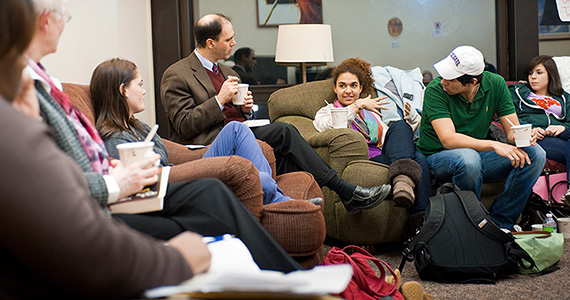
Yes Means Yes program training has been held on campus for several years.
The expectations for 2014–2015 are crystal clear: Sexual violence will not be tolerated at łÉČËÍ·Ěő.
As stated in a September 3 signed by President Jeffrey Herbst, Provost and Dean of the Faculty Douglas Hicks, and Dean of the College Suzy Nelson, the administration is “especially keen to bring the issue out in the open … during the first several weeks of the semester, when new students are proven to be most at risk.”
According to the e-mail, letters sent to all students and parents clearly state łÉČËÍ·Ěő’s zero-tolerance policy. They also reinforce the link between excessive drinking and negative consequences such as unwanted sexual contact and assault.
Also front and center in all communications is the explanation of for resolving complaints, and a call for students to sign up for bystander intervention training through the Shaw Wellness Institute.
While 140 students were trained last year, the e-mail acknowledged, “We still have a long way to go before all members of our community are educated and empowered to recognize, stop, and report unwanted sexual advances.”
Over the past two weeks, bystander trainings were conducted for Community Leaders and Link staff. The next goal is to train all first-year students within the next few weeks.
Also new this year, łÉČËÍ·Ěő’s — composed of students, faculty, and staff and led by Dean of Students Scott Brown — will serve as the umbrella organization for all sexual-respect activity on campus.
The group plans to host a sexual climate summit this fall, and sponsor a series of student-written stories designed to promote awareness and participation in programs such as peer mentoring and Yes Means Yes.
While working as summer interns in the Office of University Communications, Hannah O’Malley ’17 and Lauren Casella ’16 volunteered to help coordinate the series and contribute stories. Other student writers will be welcome.
“I wanted to get involved because of my work with the first-year class,” said Casella, who mentors students in her role as a Link. “By sharing the perspectives of older students who have experience in this climate already, the series can promote a safer culture to the community’s newest members. By featuring student writers, I hope we can convey the varied nature of the sexual climate here, and the power each individual has to make the most of it on his or her own terms.”
O’Malley, who is trained to host bystander training events, hopes to make people more comfortable talking about “taboo subjects.” She said, “Positive sexuality is something I care a lot about because it affects everyone, whether they choose to engage in sexual activities or not. Communication and the ability to talk about taboo subjects are integral parts of positive sexuality and it is important that the university fosters such discussions.
“After all,” she said, “the goal of a liberal arts education is to produce lifelong learners. Interpersonal relations form a large part of our lives, so it can only help to be better educated.”
